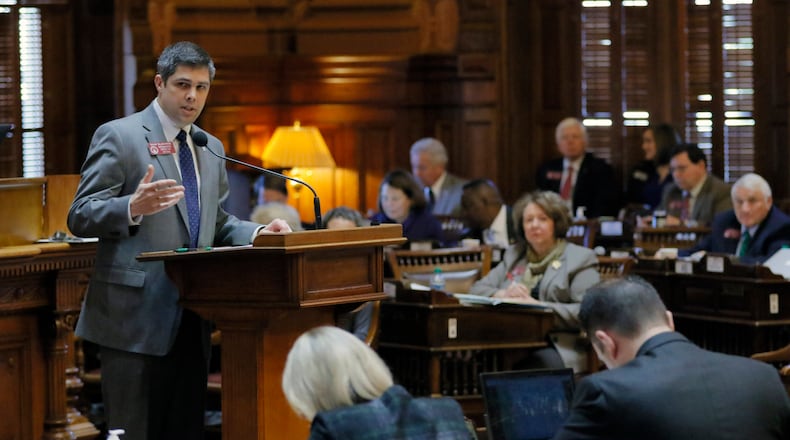House and Senate leaders agreed to a measure late Monday that would gradually drop the state’s income tax rate from 5.75% to 4.99%.
The House and Senate passed the measure in the final hour of the 2022 session.
Under a rewritten House Bill 1437, a compromise was reached to lower the rate to 5.49% in 2024, then it would step down until it reaches 4.99% in 2029.
Standard exemptions would rise gradually as well. The standard exemption would eventually go from $2,700 for single filers to $12,000. For married couples filing jointly, it would go from $7,400 to $24,000.
The original House bill would have saved taxpayers $1 billion a year. The new version could save even more, but it would take several years. Danny Kanso, a senior policy analyst for the left-leaning Georgia Budget & Policy Institute think tank, projected it would save taxpayers and cost the state more than $2 billion.
“It’s simple, it’s fair and it allows hardworking Georgians to keep more of their money,” said House Ways and Means Chairman Shaw Blackmon, R-Bonaire.
“It’s a great day for a tax cut,” said Senate Finance Chairman Chuck Hufstetler, R-Rome.
Critics of the original House version said 500,000 families would have paid higher taxes under its plan because of other changes it made in tax law, but legislative leaders said the final version aims to ensure nobody would pay higher taxes.
As is mostly the case when lowering tax rates, the biggest beneficiaries would be top income earners. They would pay a smaller percentage on their higher earnings.
The measure would delay the phase-in of lowered rates any year the state doesn’t have enough money in reserve to pay for it, any year state tax collections don’t grow at least 3% or if collections are lower than any of the five previous years.
House leaders said it would be the biggest income tax cut in state history.
Lawmakers voted in 2018 to reduce the top state income tax rate from 6% to 5.75% in response to federal tax changes that, officials thought, would force many Georgians to pay higher state taxes.
The first cut, in 2018, saved Georgians more than $500 million.
The 2018 legislation set up a second vote, in 2020, to lower the rate again to 5.5%, but then COVID-19 hit, the General Assembly session was suspended and the state faced a brief recession.
The state’s economy rebounded nicely, in part because of waves of federal COVID-19 relief money that was approved by Congress almost as soon as the nation’s economy shut down to fight the pandemic.
Thanks in large measure to massive federal COVID-19 relief funding, the state ended fiscal 2021 with a $3.7 billion surplus, and lawmakers approved refunding $1.1 billion of that surplus to taxpayers last month.
Tax collections are running 16% ahead of last year for the first eight months of fiscal 2022, and Kemp and lawmakers have backed a massive spending increase this year, including pay raises for 300,000 school, university and state employees.
In typical years of economic growth, the state sees an increase in tax revenue of about $800 million to $1 billion. So hypothetically the tax cut House leaders are proposing would eat up most if not all the revenue growth used to fund school enrollment and health care expenditure increases in the annual midyear budget.
While supporting a tax cut, Senate Appropriations Chairman Blake Tillery, R-Vidalia, has warned the good fiscal times won’t necessarily last.
“The storm clouds are on the horizon in terms of economic conditions,” Tillery said earlier in the day while detailing the upcoming year’s budget.
Kanso, the policy analyst, said, “Lawmakers claim they want to put money back in the pockets of Georgia families to help them afford necessities but their plan passed by the General Assembly simply does not add up. Yet again, lawmakers are skewing the tax code so that the wealthy get massive tax cuts and would not have to pay their fair share, but only paying lip service to support for low- and middle-income families.”
\
About the Author
Keep Reading
The Latest
Featured




